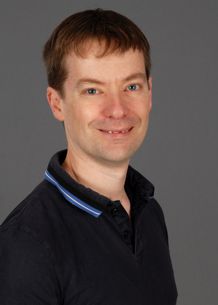Dr Phil Hasnip
EPSRC Research Software Engineering Fellow
Profile
Career
PhD (Cambridge, 2001), Dip. Comp. Sci (Cambridge, 1996), MA (Cambridge, 1995)
Departmental roles
- Graduate Skills Coordinator
University roles
- AI, ML and Data Science Working Group
External activities
Memberships
- UK RSE Association
- IOP
Invited talks and conferences
2-3 invited seminars each year, 3-4 invited talks at workshops each year.
Media coverage
Interviewed by the Software Sustainability Institute.
Research
Overview
Research Software Engineering (RSE) is the creation of well-designed, reliable, efficient computer programs to solve research problems. The main focus of the group at present is on materials modelling, a large research field with important industrial applications which affect our everyday lives. We work in partnership with key national experimental facilities, including SuperSTEM, the ISIS neutron and muon facility and Diamond Light Source, and national and international computing centres including Argonne Leadership Computing Facility, the UK HPC facility ARCHER, and many UK Tier-2 HPC facilities. We also work with industry, including BIOVIA (Dassault Systemes), NVIDIA and ARM.
Projects
- Accelerating first-principles simulations on emerging computer architectures (with NVIDIA, ARM, Argonne Leadership Computing Facility and the Universities of Cambridge and Bristol)
- Dielectric modelling for advanced first-principles simulations
- Nanomaterials for thermoelectric applications
Research group(s)
Research Software Engineering Group:
- Ben Durham (PhD; with Matt Probert, CMD Group)
- Matt Smith (PhD; with Mike Payne, TCM Group, Cambridge)
- Peter Byrne (RSE; with Matt Probert)
- Arjen Tamerus (PhD; with Steven Wright, Computer Science & Mike Payne, TCM Group, Cambridge)
- Alban D'Harcourt (PhD; with Matt Probert, CMD Group)
Grants
York: Transforming Research-Oriented Software Engineering (April 2018 - March 2023)
A 5 year Fellowship to improve, optimise and extend research software in a wide range of scientific fields, including materials modelling, molecular chemistry and plasma physics, and to promote and develop RSE skills in the UK and world-wide research communities.
Particles at Exascale (Dec 2021 - Nov 2024)
Part of the UK's ExCALIBUR exascale readiness program, the Particles A eXascale (PAX) project focuses on particle-based modelling across length- and time-scales, from quantum mechanical simulations of electrons and atoms, through engineering applications (e.g. for coastal defences) to astrophysical simulations of galactic evolution.
CASTEP-USER (June 2022 - May 2025)
CASTEP (www.castep.org) is a quantum mechanical materials modelling program which is widely used in academic and industrial research. In this project, we are focusing on software developments to enhance the experience of CASTEP's users, and in particular the ease with which CASTEP can be used to guide and interpret experiments.
Collaborators
- Mahmoud Hussein (University of Colorado Boulder, USA)
- Nichols Romero (Argonne Leadership Computing Facility, USA)
- Ming-Hsien Lee (Tamkang University, Taiwan)
- Adrian Jackson (Edinburgh Parallel Computing Centre)
- Simon Macintosh-Smith (University of Bristol)
- Chris Armstrong and Filippo Spiga (ARM)
- Mark Berger (NVIDIA)
- Victor Milman and Alexander Perlov (BIOVIA)
- Keith Refson (Royal Holloway, University of London)
- Chris Pickard (University of Cambridge)
- Jonathan Yates, Rebecca Nicholls and Ian Bush (University of Oxford)
- Stewart Clark (University of Durham)
- Dominik Jochym, Leonardo Bernasconi and Barbara Montenari (STFC Rutherford Appleton Laboratory)
- David Quigley and James Kermode (University of Warwick)
- Andrew Morris (University of Birmingham)
- Anthony Reilly (Dublin University)
- Dawn Geatches and Jerome Jackson (STFC Daresbury)
- Quentin Ramasse (SuperSTEM)
- Steve Collins (Diamond Light Source)
Available PhD research projects
- Magnetic modelling from first-principles
- Uncertainty quantification for first-principles materials modelling
- Materials design for spintronic devices
- Nanophononic metamaterials: engineering phonons to convert between heat and electricity (with the University of Colorado Boulder)
- Accelerating first-principles simulations on emerging computer architectures
Teaching
Undergraduate
- Advanced Computational Laboratory (3rd Year)
Postgraduate
- First-principles materials modelling
- Introduction to Linux
- How to write a basic web page
- A beginner's guide to LaTeX
- How to give a scientific talk
- How to create a research poster
Other teaching
- CASTEP Training Workship (annual)
- Advanced CASTEP Developer Workshop (biennial)
- HPC Autumn Academy

